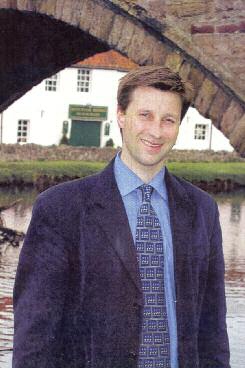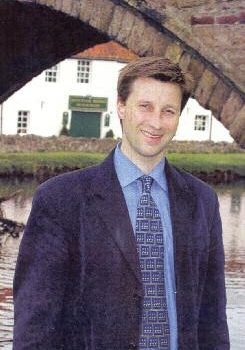
I suppose I thought that my upbringing was as normal as anybody else’s and made the most of circumstances at the time. I went to the playgroup in the village and another homespun version where we would take turns at friends’ houses. Although I never knew this until very much later, my parents were recommended not to send me to the local school by the headmaster because I came from the “big hoose”. Instead, I went with others on the school run into Haddington, to the small privately-run primary school called the Compass. If there was hard work, it was certainly mixed with hard play and we would often go to each others’ houses to play in the garden (which was often not small). “Auntie Dot” would entertain us for birthday parties, which were traditionally at friend’s houses with the whole class invited.
[At home] it did not seem odd to have concerts in the dining room; after all, we could seat over 100 people. Mum knew a lot of musicians, as a music teacher and the gatherings were very sociable, even if a little boring for a young child. Dad worked from home and was normally in his study with a typewriter or going to meetings, often in the evenings too! He loved nothing more than to be mending things in his workshop, and with electric wiring and bits of furniture as old as ours, there was always plenty to occupy him. He had to give people tours of the house and at least once a year, there was an open day for Scotland’s Gardens Scheme where anybody could come round and have a cup of tea too. Our record for one charity afternoon was, I think, around 900 people and perhaps that was the time when I remarked that “there are too many people in my house”! Such an event always caused a flurry of activity in clearing up along the drives – sometimes I would get my picture in the papers standing amongst the daffodils.
There were always, it seemed, masses of “workmen” around – tradesmen of all descriptions and often associated with something called dry rot. This seemed very interesting though it was not greeted with enthusiasm by my parents. If ceilings needed to be replaced, the scaffolding required to get materials up to the third floor or above was quite high – perfect for climbing up! In fact it meant that access to the roof was perhaps easier than climbing through the tower window, so taking friends up to play was straightforward if parents were not around to stop it. Ladders normally came in three sections and I got quite adept at climbing them (aged four). Skateboarding was a necessity as the loo seemed miles away from our kitchen. Many other families shared the house with us in the three flats; they came from all over the world and there were other children nearby in the cottages, so the chances of being bored were slim.
Jenny and Willy were always around. I used to enjoy going down to the lodge to see Jenny when she was not cleaning our house. We used to go and see Elisa, my grandmother’s former housemaid who lived in Ivy Cottage in the village. The stairs seemed dark but when we went in, she always gave us barley sugar. Sometimes we would go for long walks and play hide and seek down the low path by the river. If my friends came to play, the wigwam would come out and we would run around with bows and arrows and toy guns, or cycle down to the village to get some bubble gum from the Johnston’s at the Granny Shop. Making holes in the grass lawn for golf was essential to play the game properly, but it didn’t go down well with Willy the gardener.
The blissfully naïve days of primary schooling came to an end when I went to boarding school in Musselburgh. It was only seven miles away, but a different world altogether. We went for runs around the racecourse, studied hard and played lots of rugby, cricket and marbles. Matches would be arranged with other schools, sometimes outwith the county. I was learning to play the cello and this meant entering competitions in Edinburgh and going to orchestra practice on Saturday mornings. Our concerts were in Stewarts Melville Hall, which seemed huge when all the support team came to listen. Back home, the Pencaitland Music Club was a ready forum for performing as well as bringing in considerable talent from outside. Concerts were often given in houses round the village if not at the Church Centre.
Holidays changed slightly as my friends were less local than before. We still had lots of Celtic v Rangers games on the lawn where Kenny Dalgleish and Danny McGrain would often be heard mentioned by the commentary team. Picnics continued to be held throughout the county even in the snow; the river pools in the Lammermuir Hills and the park at Gifford was perhaps frequented less though enjoyed just the same. Greater adventures could be taken at the beach, normally Gullane with the wonderful sand dunes. The discovery of the children’s golf course in North Berwick saved the lawns at home from further damage. Church-going was a regular event, both in the village and at Holy Trinity in Haddington where both parents have served on the vestry. The Sunday school was not as active then as it is now.
Dad used to take me to the farm to see what was going on. We would go to his other office in the farmhouse and would often see Charlie and Jean Young who ran the farm with at least six other men. I did not drive any of the machines, though I loved sitting on the combine at harvest time when dad would bite knowingly on the corn and charge up the rows of straw in his car. We never got stuck in our two-wheeled drive Maxi though it would get put through its paces on the estate. Bish was always working at the sawmill, or driving his crane with a big tree on the back. He had the wonderful smell of any forester – that of cut wood which would surely challenge even the most expensive aftershave.
At Christmas time, we would usually have an estate party when lots of people from round about would come and we would play games, sing carols and have a party tea. The tree would take ages to decorate as it was so big and dad would normally spend most of the time sorting out the lights because they fused so easily. A bit of snow in the holidays was made the most of and the sledges would be out as soon as it was light. Too much enthusiasm could lead to a scrape with a bush and a bump into the burn.
Once I went to school in Edinburgh, the focus changed and the capital was the place to go, not only for rugby matches, but musical events and staying the weekend with friends. This is not to say that they did not come to stay at home too, in fact there often would be friends staying and relatives by the score who enjoyed the East Lothian countryside and coming back to the family pad. There was a “silly season” when everybody seemed to want to come and stay, normally coinciding with the Edinburgh Festival. For school, I would get the bus from Tranent and come back often to Pencaitland. There were other children who got the bus from Haddington, so the journeys, though sometimes long, could be entertaining nevertheless.
Travelling for two hours a day on a bus seemed on the whole a waste of time and my father, who was then past retiring age, though he never formally retired, had less energy than he felt a growing teenager needed. Boarding school in Perthshire was a wonderful opportunity taken as an alternative. It meant sadly that East Lothian featured even less and the circle of friends was spread even wider than before. They were good years nevertheless, but it was not until I began to work back in the county twelve years later that I realised the extent, variety and beauty of it that I had taken for granted for so long.
This return to the county was in order to start work as a surveyor in Haddington and to take over the running of the family estate after my father had died some five years earlier. It takes more than a decade to make one’s mark on a rural business. My approach was different to what had gone before as times had changed and resources for bringing them about had also. Edinburgh was becoming a source of far greater opportunity than it had been in the past, as far as making use of a large listed building was concerned – one that is excessively large to live in as a home and prohibitively expensive to support without money coming in from elsewhere. The house swallowed up money and gave nothing back financially; the woodlands needed attention but income from timber was negligible and declining; the farms continued to provide the backbone for the estate but it would only be a matter of three years before their contribution would be eclipsed and alternatives for them needed to be found.
A local team has largely been responsible for making our East Lothian estate become a pleasure to belong to and to see its position grow in the county as a whole. The old estate structure is returning with departments for traditional as well as new activities beginning to develop. It is proving to be a tried and tested lifestyle where loyalty to people counts for a great deal. I hope our efforts will allow the next generation to enjoy growing up in East Lothian as much as I have been privileged to’.
Sir Francis Ogilvy succeeded his father as the 14th Baronet of Inverquharity in 1992
